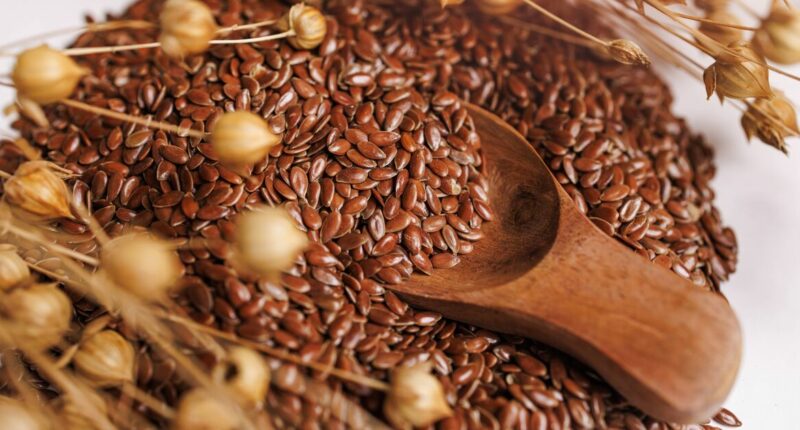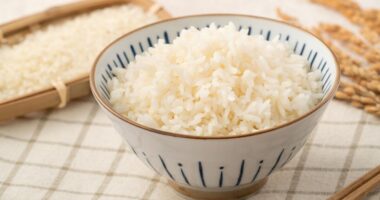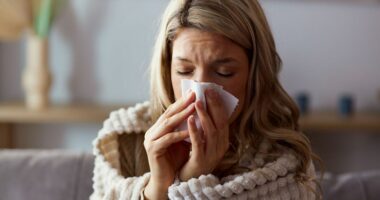Share this @internewscast.com

The image showcases a close-up of flax seeds and a wooden spoon against a clean white background. Additionally, there are raw dried plants of flax seeds that can also be seen in the picture. (Image: Getty )
Symptoms of menopause and perimenopause can begin as early as your mid-thirties. One day, you’re breezing through meetings and workouts; the next, you could be wide awake at 3am, feeling increasingly forgetful, or grappling with erratic mood and energy fluctuations.
Jo Meadows, a nutritionist specialising in women’s health, has teamed up with the Benefit Juice team to offer general nutritional advice for those navigating menopause and perimenopause. Her focus is on educating women about the significance of adopting a comprehensive dietary approach during this phase of life.
Jo explains: “Menopause is a highly individual experience; there’s no single food or drink that will ‘fix’ symptoms.” However, she suggests that cultivating a balanced, nutrient-dense diet “can help support how you feel.”
Jo identifies five ‘everyday’ foods that could make a difference. She commends them for their high vitamin and mineral content, which can bolster energy, bone health, brain function, and mood, particularly when incorporated into a diverse whole‐food diet, reports Surrey Live.
Ingredients Jo likes for their potential supportive properties:
- Flaxseed
- Berries
- Beetroot
- Apples
- Tart cherries

During menopause, a woman’s ovaries stop releasing eggs. (Image: Getty)
Flaxseed
Jo notes: “Flaxseeds provide a small extra boost of plant-based omega-3, fibre and prebiotic fibre – important for gut and cardiovascular health.” Flaxseed might assist in alleviating certain menopause symptoms.
It is rich in lignans, which possess phytoestrogen qualities that can help balance estrogen levels within the body. Flaxseed could be a real boon for women going through menopause. Research suggests that flaxseed may significantly reduce the number and severity of menopausal symptoms like hot flashes, night sweats, and vaginal dryness.
Berries
Jo says: “Rich in antioxidants, berries may support overall brain and heart health.” Studies have shown that consuming fruits, particularly berries, can diminish the prevalence and severity of hot flashes and night sweats, which are common markers of menopause.
Chock-full of antioxidants, berries are thought to help hormonal equilibrium and lessen inflammation, promoting well-being during menopause.
Beetroot
“Beetroot provides dietary nitrates, which can help with blood flow and exercise performance,” Jo says. Beetroot may support energy and cardiovascular health, and has potential benefits for mitigating menopause symptoms, particularly those related to heart health and weariness
Packed with natural nitrates, beetroots are known to boost blood circulation, potentially reducing the risk of cardiac issues—concerns often heightened post-menopause due to plummeting estrogen levels. Their high iron content can also rev up stamina and vitality, countering the draining fatigue frequently experienced throughout menopause

Tart cherries contain melatonin and tryptophan (Image: Getty)
Apples
Jo advises: “Apples provide fibre for gut health and contain plant compounds, including phytoestrogens, but in small amounts.” Including apples in a healthy, balanced diet rich in fruits and vegetables could potentially alleviate certain menopause symptoms, particularly hot flashes.
Alongside other “cooling” foods like bananas, spinach, and broccoli, apples can help regulate body temperature. The fibre in apples aids digestion, while the potassium contributes to blood pressure control, both beneficial during menopause
Tart cherries
Jo elaborates: “Containing melatonin and antioxidants, cherries may support general sleep quality in some people. However, the effects are usually small and not a substitute for broader sleep and lifestyle strategies.”
Owing to their melatonin and tryptophan content, tart cherries might help ease certain menopause symptoms, especially those linked to sleep disruptions. They could also offer benefits for mood and inflammation.
Can diet affect menopause symptoms?
The impact of a well-structured diet on menopause symptoms can be significant. A balanced and nutritious diet could aid in managing and potentially reducing the severity of certain menopause symptoms, while certain food choices might worsen them.
Studies have shown that consuming foods brimming with phytoestrogens, including soy products, may emulate the effects of estrogen and could be beneficial for alleviating menopause symptoms like hot flushes.
It is crucial to ensure adequate intake of calcium and vitamin D, through diet or supplements, to maintain bone health during menopause, as declining levels of estrogen can lead to decreased bone density
Jo stresses: “The most important thing is to focus on a balanced, diverse diet including plenty of colourful vegetables and fruit, quality proteins, healthy fats, and fibre rich foods such as whole grains and legumes. These support all aspects of health, including bones, brain, heart, and gut, which are especially important during menopause.”

Flaxseeds provide a small extra boost of plant-based omega-3, fibre and prebiotic fibre (Image: Getty)
A spokesperson from Benefit Juice, creators of the new juice packed with Jo’s top five recommended foods, claims their Menosupport Blend can “give a helping hand that can be beneficial at a time when a convenient boost is needed”. They continued: “It’s not a standalone health solution and won’t magically make hot flushes or fatigue disappear, but it can provide some key vitamins that support your body.”
What other measures can alleviate symptoms of menopause?
Beyond Hormone Replacement Therapy (HRT), adopting lifestyle adjustments such as consistent exercise, a wholesome diet, and engaging in stress reduction techniques can mitigate symptoms associated with menopause. Some individuals find relief via alternative therapies, including yoga, acupuncture, or certain herbal supplements.
Besides dietary choices, Jo emphasises that aspects such as regular exercise, quality sleep, stress management, and maintaining social ties play vital roles in well-being during menopause. She clarifies: “Supporting yourself through menopause isn’t about restriction or quick fixes – it’s about small, sustainable habits that make you feel stronger and more like yourself.”
Maintaining a healthy weight can help reduce the severity of hot flushes. It’s equally important to keep well-hydrated by drinking plenty of water throughout the day.
Creating a consistent bedtime routine and schedule can improve sleep quality. Sharing your experiences with others, be it friends, family, or even a therapist, provides emotional support and helps in coping with the transformations associated with menopause.












